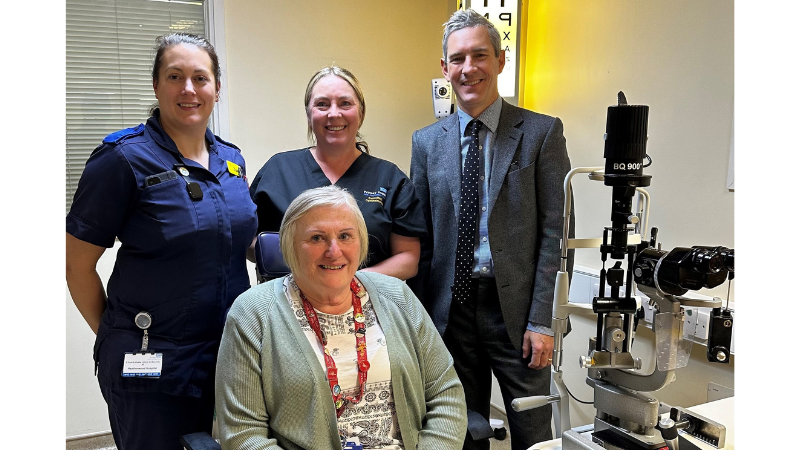
The hospital stay with Frimley Health
Date published: 24 January 2024
Innovative use of AI technology to phone and assess cataract patients after their operation is proving a success story.

“Using Dora has allowed our nursing workforce to reallocate time to valuable face-to face clinics. We have been able to expand our cataract pre-op assessment clinics to Wexham Park Hospital for the first time,” said Tom Poole, consultant ophthalmologist at Frimley Health. “It’s saved a lot of nursing time and is the way forward, I think. Dora interacts and engages with patients, and understands what they are saying.”
He added the AI system allows more flexibility for the follow-up call, meaning more convenience for patients.
“I really like the fact that we have not only saved nursing time, but patients are getting information and contact from us at a time that suits them best. Dora can call dozens of patients all at 9am on Monday morning, if that’s what people need.”
The project has proved so successful it has been entered into two categories for this year’s HSJ Digital Awards.
Frimley Health handles a high volume of cataract surgery with 5,000 procedures carried out each year. Routine cataract patients receive a telephone follow-up call, to assess the procedure and determine if the patient needs to be seen again at the hospital, or if they could be discharged to an optician.
Pressure on resources, already stretched from the backlog created by the pandemic, meant the call was slipping from within two weeks to 10 weeks. The AI telephone solution, created by Oxford company Ufonia, provides a digital assistant which can deliver clinical conversations and help alleviate department pressures. A month after the launch, the surgery-to-call time had fallen from 10 to two weeks, with the backlog of calls cleared.
Dr Lorraine North, head of ophthalmology, said that as well as improving efficiency, patient feedback regarding interaction with Dora has been good. “Patients love it. We have had only one person, of all the calls that have been made, who said Dora wasn’t personable. We’ve also had a patient who wanted to take Dora to dinner, and another is writing a poem for her.”
She added that Dora makes recommendations, not decisions, and that her work is checked by human clinicians. “There will always be a human element, as we have to maintain oversight.”
Ufonia’s director of operations, Dr Louisa Stacey, said data showed excellent results for Frimley Health, as part of the system’s trial being held across the south-east.
“Frimley Health has excellent pick-up and completion rates for Dora calls,” she said. “Of the south-east group, Frimley Health has the best core completion rates. Patients know they have their call coming up, and Frimley patients seem happy to pick up the phone and have an automated conversation.”
Manju Chandran, consultant ophthalmologist at Frimley, put the success down to the approach of the whole department – whether bookings and administration teams, or nurses and doctors – in understanding the care pathway and Dora’s part in it, and communicating that with patients.
“I strongly applaud the organisational teamwork in Frimley that has made Dora possible. The ability to pursue change, to adapt it as we need it and to get it right,” she said. “Frimley is leading the way.”
The team is looking to build on Dora’s success, now using the digital assistant to make patient related outcome measures (PROMS) calls – asking patients before and after surgery a short series of questions about the quality of their eyesight – and pre-op reminders as well.
Plans to fully integrate Dora with the Trust’s electronic patient records, to make using the AI system easier for staff, will also be a national first.
Pictured top: Matron at the eye treatment centre Zoe Freeman, head of ophthalmology Dr Lorraine North, consultant ophthalmologist Tom Poole, and patient pathway co-ordinator Janette Robinson